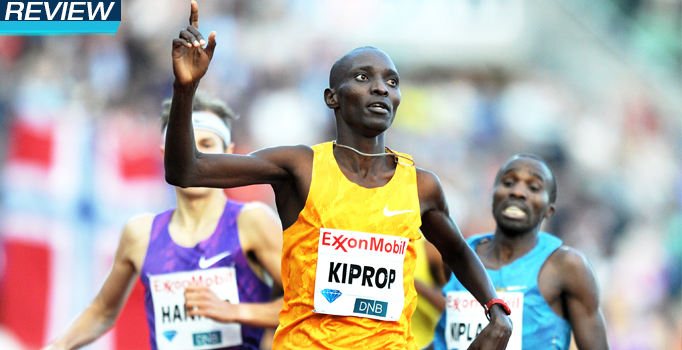“It feels like home here,” said the 2008 Olympic and two-time world 1500m champion, who sprinted home in 3:51.45 ahead of the fellow Kenyan who finished last year as world leader, Silas Kiplagat, in a race where an early attempt to get away by Djibouti’s Ayanleh Souleiman was frustrated.
“It was my fourth time here and my fourth win, which is excellent for me.
“I knew Souleiman asked for a very fast pace, but for the rest it was too fast and going into the last lap we were nearly all together.
“At that time I was thinking there is a good chance I can win again at Bislett.”
Souleiman went with the pacing pair and then attempted to put some distance between him and the rest of the field, getting 20 metres clear.
But by the bell, Kiplagat had towed the opposition back to his shoulder, and the Djiboutian athlete was eventually passed by three men in the final straight. He showed his frustration afterwards by punching his fist into the track before rising and putting his head in his hands.
Kiprop held off the challenge of his shorter compatriot, who finished in a season’s best of 3:51.72, and there was joy for another unexpected high performer – something of the theme for the night – as Pieter-Jan Hannes of Belgium took third place in a national record of 3:51.84 before producing a punch in the air which signalled delight rather than despair.
Genzebe Dibaba’s pursuit of the seven-year-old world 5000m record set by her sister is going to have to be continued.
The 24-year-old younger sibling had been bold in announcing she would seek to better the mark of 14:11.15 her elder sister Tirunesh had set on this very track a short while before completing the 5000m and 10,000m double at the Beijing Olympics.
As the second of the two pacemakers stepped off the track, Dibaba briefly had the stooping figure of her fellow Ethiopian Senbere Teferi in front of her, but soon she was striding out on her own, a lone figure for the latter part of the race.
But the longer the race went on, with the flags on the rim of the cooling stadium testifying to the swirling elements around her, the steeper Dibaba’s task appeared.
By the time she went through 3000m, she had a 50-metre lead, but at 8:39.41 she was almost 10 seconds off the desired world record pace of 8:30.
She passed 4000m in 11:31.70 and reached the bell in 13:16.3. She needed a sub-55-second final lap, which was never really going to happen. She managed 65 seconds, being cheered home in a time of 14:21.29, which was almost two seconds slower than her best this season.
Another day, another chance – maybe. But not for a while at least, according to Dibaba.
“I tried hard, but the pacemakers could not do what I needed,” she said. “Of course it was also cold and the wind played a role but overall I’m OK with the race. I did my best – I’m not sure whether I will try to break my sister’s record again.
“Now my full concentration will go towards the 5000m at the Beijing World Championships.”
Murielle Ahoure, the 100m and 200m world silver medallist from the Ivory Coast, was favoured to win the 100m here having got her season off to an electric start with a clocking of 10.81 in Eugene.
She lived up to expectations as she won in 11.03, racing into a -0.6m/s wind to finish ahead of Jamaica’s double Olympic 200m champion Veronica Campbell-Brown, who was timed at 11.08.
The men’s 200m was won in 20.21 by France’s Christophe Lemaitre, who held off the challenge of South Africa’s Anaso Jobodwana, who clocked 20.39 ahead of Britain’s Richard Kilty, who recorded 20.54.
Mike Rowbottom for the IAAF and the IAAF Diamond League
11 June, 2015









